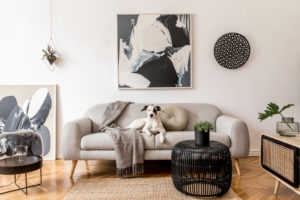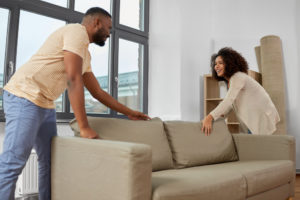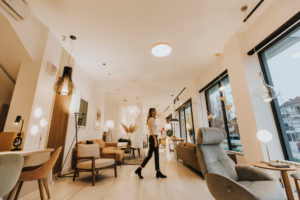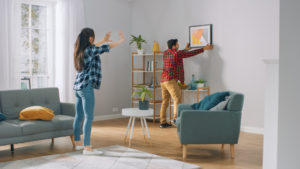Welcome home!
All of your dreams of being in a new space are finally coming true. Except you forgot one part… the one where you put in the effort to actually arrange the furniture exactly how you want it. That’s not exactly the most fun step of getting into a new place, but it’s worth it!
We’ll help you with some tips for setting up furniture in your new home so you can get set in no time.
1. Consider the Room’s Purpose
It’s best to tackle the furniture planning room-by-room. Giving proper attention to each room will ensure you create a comfortable space that you don’t need to rearrange right away.
Before you begin, start with the basics. Think about the purpose and function of the room. This may seem obvious but trust us, it can be easy to lose sight of this point. If you’re setting up your living room as a cozy after-work space, don’t try to turn it into a dining room as well. You’ll end up cramped and cluttered with a room that feels thrown together.
Decide on the primary purpose of the room you’re setting up, and make decisions that serve that idea.
2. Decide on a Focal Point
A focal point in a room is a place to draw the eye and helps to create balance within the space. Oftentimes you’ll need to create this point with furniture or decor. Fireplaces often become natural focal points, as do picture windows.
If your room lacks a natural focal point, you’ll find that the largest piece of furniture often becomes that point. That’s usually your bed, sofa, dining table, etc. Start with the focal point and build around that.
3. Start with Large Pieces
As your largest piece of furniture will be your focal point, start by placing it first. Having a primary starting point will make the rest of the room setup easier. Since you’re in a new home, there’s a chance that your focal piece won’t fit the new room. No matter your attachment, be realistic. If your dining table is too big for your new dining room, it may be time to trade it out for a new set.
4. Go for Balance
Your focal point will help you to ensure your room has visual balance. When a room is in balance, everything looks like it belongs – and flows – together. When you step into a balanced room there is a sense of visual harmony.
To ensure visual balance, try finding elements that pull everything together. A large area rug can help bring the room into a common space. This can tie together multiple pieces of furniture. Using similar colors or patterns can also bring a sense of cohesiveness to items that may not otherwise have much in common, stylistically speaking.
Using furniture in a variety of sizes will also help to bring some balance to the room. You can offset a large sofa or armoire with smaller accent tables, for example.
5. Think About Movement
Form and function – key elements to a well-designed space. You may love all of your beautiful furniture pieces from your old living room, but be realistic: do they fit in your new home?
Consider how people will move through the space once it’s set up. Be mindful of foot traffic and make sure the room isn’t too cluttered to move about. That includes your kids and pets too, of course! Your room should be stylish and functional all at once. If that means moving some furniture to places where it can be better used, shift them over.
Keep the room free of clutter and the movement in a good flow. You’ll feel more at home.
6. Use Visual Tricks
Using visual tricks will help you create and recreate the space you want. Mirrors are a great way to add a touch to your room. They can help to reflect light, making your room brighter and more inviting. Placed thoughtfully with the intention of expanding your space, they give the illusion of a bigger room. They can also add a little pop of detail without distracting from your focal point and flow.
7. Consider Your Lighting
Setting up your furniture isn’t just about sofas and tables. Your lighting can also play a key role in how you arrange the functional pieces in your room. Start by considering overhead lighting and where you might have dark or visually heavy pockets of the room. Place tables and stands in ways that both make sense for the room’s flow and can hold lamps as needed. If you have a big heavy sofa or chest in the room, make sure you have some lighting to visually lighten them up.



